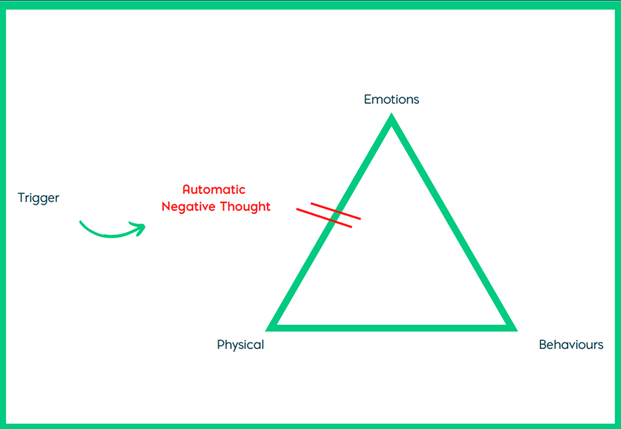How to Identify and Challenge Negative Self-Talk
Did you know that the average human has more than 6000 thoughts per day?
That’s 500 per hour. Over 8 thoughts per minute!
We all do a lot of thinking - without even trying.
The majority of our thoughts are automatic (they just pop into our heads).
But, unfortunately, not all of these thoughts are positive.
In our recent webinar, Mitchell Mclean from Veritis joined us to talk about wellbeing in the workplace. A registered psychologist, Mitchell knows a thing or two about negative thoughts - and how to stop them.
Read on for the full scoop on negative thought patterns: what they are, how they work and take back control of your thoughts.
What is negative self-talk?
Self-talk is exactly as it sounds: it’s the way you talk to yourself.
As thoughts automatically tick through your mind each day, you’re engaging and interacting with the world - and responding internally.
Did i hit send on that email?
What I’ll have for dinner?
I’ll just watch one more episode…
Self-talk is your inner voice - an internal monologue that combines your conscious thoughts with your beliefs and biases.
Negative self-talk is when your inner voice sounds more like your inner critic. In Mitchell’s words, ‘It’s the internal monologue of blame or self-doubt into ourselves in
response to a negative occurrence or upcoming challenge.’
What does negative self-talk sound like?
Negative self-talk is often in response to a negative occurrence. This can be in the present (‘oh, i’m such an idiot for leaving my keys at home!’) or long in the past (‘these bad things always happen to me’).
Excessively negative and pessimistic, negative self-talk (AKA automatic negative thoughts) can eat away at your confidence.. It can trap your mind and make you feel like a failure before you even start - ultimately putting a pin in your true potential.
For example, if you’re thinking about a future event, it’ll be an internal monologue that doubts yourself, or already admits defeat - “You’re going to muck up this presentation… you’ll never get this job…” With enough of this type of thinking, you
workplace wellness can start to decline.
The styles of negative self-talk
Mitchell shared that health researchers have (so far) identified up to 12 different styles of negative self-talk.
Here are his top 4:
- Mind-reading - “Mind-reading is when we’re quite confident that we know what other people are thinking at any given point in time. They might give you some sort of facial cue and you go, ‘Oh, well that's because they're upset with me.’”
- All or nothing - “This is thinking quite black and white quite broadly. Everything is always going to be very bad and there's no room for middle ground, there's no room for shades of gray.”
- Catastrophizing or excessive worrying - “When you don’t have much information to go on, but conclude the worst possible outcome.”
- Labelling - “Like calling yourself an idiot for leaving keys at home. It’s not quite logical, it's not quite fair.”
How does negative self talk work?
In our webinar, Mitchell shared a diagram and a story to help explain how negative self-talk works:

To explain it further, he shared an example:
It all started with a text.
“One afternoon, you text your mate: ‘Hey, what's up? How's it going? You still good for dinner tonight’
And this friend of yours is generally pretty good at replying - usually within three minutes or five minutes. But it's been about a couple of hours and you still haven't heard anything from them, so it's very out of character. This is not like them all…”
Now based on your past experiences, some negative automatic thoughts might start churning.
“You might start thinking:
- I've done something to upset my friend, that's why they're not getting back in touch with me.
- They don't want that relationship to continue. That's why it's been two hours.
- I've really upset them, I've annoyed them."
This type of thinking is an example of catastrophising.
Based on limited evidence, based on something that hasn't transpired, the thoughts have gone to a place that isn’t positive.
It’s a classic example of a negative automatic thought.
But what happens next? Well, there are consequences - emotional, physical, and behavioural reactions.
Emotional consequence
For example, in this situation it could be fear. ‘This is a relationship that really means the world to me… I'm fearful that I've done something wrong and I'm going to lose them."
You have an emotional response to your negative automatic thought - not the actual event.
Physical consequence
And then of course we talk about the physical or sensational aspect of that thought.
“So maybe my heart's beating really, really quickly. Maybe my palms are getting really sweaty, maybe I've got headaches, maybe I'm feeling a little bit dizzy, a little bit disoriented.”
Behavioural consequence
You may adapt your behaviour to meet the physical and emotional consequences.
“You may say ‘I'm going to throw my phone away and I'm not going to go out to dinner with her tonight because she chose to ignore me.’ Or there might be that safety check that I'm constantly messaging them. "Is everything okay? Have I upset you?"
Where do negative automatic thoughts come from?
“They don't just happen,” says Mitchell. “They have to be developed.”
In most cases, there are predisposing and developmental factors.
This can include:
- Our upbringing
- Our culture
- The direct influence of the environment we are in
- Personal experiences or situations we've succeeded or failed in previously,
- Personality and genetics.
What is the impact of negative self-talk?
Negative self-talk can have a significant impact on your wellbeing.
It can lead to:
- Chronic inappropriate self-blame
- Low self-esteem
- Anxiety
- Depression
“Negative self-talk is at the core of a lot of mental illnesses,” says Mitchell.
“I think of depression as an inflexibility in thinking. Or anxiety; a real fear about the future and what it has on hold for you. It can really deteriorate your confidence.”
And that loss of confidence can have long-term consequences.
For example, let’s think about romantic relationships.
Negative self-talk can derail your dating life. If you’re catastrophising about how it’ll go, you're probably just going to avoid it altogether - never realising your potential as a partner.
“What could be a better coping strategy than not dealing with the problem at all? Very effective short term, not so much long term if you think about your goals and what's going to get you there.”
How do you stop negative self-talk?
“We need anteaters,” says Mitchell.
“‘Automatic Negative Thought’- eaters.”
ANTeaters are simple strategies that can help us cope.
Here are Mitchell’s top 5:
- Thought Detective - Ask yourself: What evidence is there that this talk is fact? Ask yourself and find out the truth. “We are terrific at turning thoughts into facts, but is what you're telling yourself factual?”
- Pros and Cons List - Put some logic to it! “It may seem boring, but take the time to list out all the possible positive and negative outcomes that could occur”
- Create Grey - Often negative talk speaks to absolutes. “Think: between perfection and failure, what other possibilities are there?
- Ditch the Crystal Ball - Remind yourself that there’s no way to know the future “Have I assigned myself to failure already? If so, what is the process of avoiding failure?”
- Perfection - Am you expecting yourself to be perfect? “Am I allowing myself space to make mistakes as part of learning? What have I learnt from this experience?”
You can practice these strategies through journaling, self-reflection, and checking in with family and friends about how you're coping.
Then, once you’re thinking critically about your thought life, you can identify, acknowledge, and challenge the problem.
“A lot of people just want to cognitively distance themselves from it,” says Miitchell. “‘I don't want to think about that, I don't want to have to acknowledge that.’ But if you try to ignore it, it's just going to come back with a vengeance.”
“So if we can accept it, then we use our techniques in order to manage those thoughts a bit more effectively.”
How to move past your negative thoughts
Once you learn to address (Identify, acknowledge and challenge) your ANTS, you can begin to move through them - reducing their impact as you respond with meaningful action.
“Say you get really good at asking these questions,” Mitchell explains. “It’s time to think: ‘What is the next purposeful focus point?’ and move through your thoughts to the next most meaningful action."
“What can you now do with your behaviour? Not in the future or three months from now, but what can you do in the immediate that'll give you a bit of relief?”
Think back to our example of the non-responsive text-friend.
Identify, acknowledge and challenge the negative self-talk, then try to find a focus point with purpose.
"You may think, ‘Well, my mate's not getting back to me on the phone. Maybe what I can do is go make a cuppa,’” says Mitchell..” Or maybe I can check in with someone else and I can find out what's going on with them. Just check in, make sure they're doing okay.’"
Reframing the situation, focusing on something with purpose, you can start a new line of thought before the negative self-talk takes root.
And if you catch yourself in negative self-talk again? Don’t be too hard on yourself.
“We all do this from time to time!” says Mitchell.
Do these negative self-talk stories sound familiar? We’re here for you.
For more automatic thought stories and strategies, watch Mitchell’s webinar in full here. And if you notice yourself struggling with your mental health or wellbeing, remember there are services that can support you in the journey.
- Lifeline - 13 11 14
- Beyond Blue - 1300 22 4636
If you’re keen to talk more about self-talk, and how it can fit into your own
workplace wellness program, don’t hesitate to contact the Veretis team - or chat to Team Talenza any time!


Recruitment International Awards’ The Rising Star’ award winner 2018, 2019 & 2020 & Best Large Recruitment Agency 2021

The Global Recruiter Asia Pacific Awards Best Newcomer Award Winner 2019

Quicklinks
Disciplines
Get in Touch
Sydney: Level 7/10 Spring St, Sydney NSW 2000
Brisbane: 40 Creek Street, Brisbane City QLD 4000
Melbourne: Level 7, 222 Exhibition Street, Melbourne VIC 3000
© Talenza Pty Limited. All rights are reserved.




